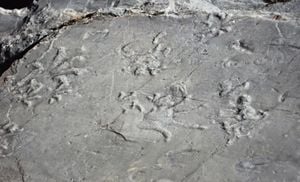Women are making strides and achieving remarkable success across the various fields of science, defying stereotypes and paving new paths for future generations. This narrative celebrates their tenacity and commitment, especially through the inspiring stories of female scientists who not only excelled but also created supportive networks to uplift one another.
Take, for example, Dr. Taghreed Mohammed Al-Turki, whose love for cell biology sparked during her time at the University of Tabuk. Her fascination with telomeres, the protective caps at the end of chromosomes, propelled her to the United States where she enrolled at Colorado State University's PhD program.
Al-Turki’s academic pursuits were not without personal challenges, as she balanced her studies with motherhood. Despite the juggling act, her passion for science never waned, leading her to work with NASA researchers studying the effects of space on human cells.
Throughout her research, Al-Turki focused on telomeric RNA and its connection to radiation exposure, contributing significantly to the Space Omics and Medical Atlas, which addresses astronaut health. The dual challenges of professional achievement and her emotional trials, such as going through divorce, shaped her resilience and commitment to scientific inquiry.
With the guidance of her mentor, Griffith, she transitioned to the University of North Carolina, where her brilliance shone even brighter. "I knew immediately she was very bright," Griffith recalled, highlighting how Al-Turki’s character and intellect set her apart.
Even during the pandemic, Al-Turki found ways to adapt her work around remote conditions, receiving support from Griffith, who would engage with her young son, easing some pressures from her unique situation. Her dedication paid off when her discoveries surrounding telomeres garnered recognition and fame, significantly enhancing her career.
Using her knowledge, she uncovered new roles for telomeres, especially their ability to produce proteins linked to cancer, addressing health issues of great urgency. Griffith noted how difficult it is to pursue science as a single mother; yet, Al-Turki proved her stature and fortitude through the adversity she faced.
Her narrative resonates with numerous women aspiring toward success within STEM, and she often encourages them, stating, "We can be both. We just need support." The significance of fostering community ties was also embraced at the inaugural "Bloom with Brilliance" conference, organized by the Society of Asian Scientists and Engineers.
This event served as reminders of the shared experiences of women, empowering Asian American women and emphasizing representation. Its theme, inspired by the lotus, symbolizes growth amid challenges, bringing together broad discussions on leadership roles and authenticity.
Reflecting on the impact, attendee Lily Zhang described the event as life-changing, emphasizing the strong connections formed among attendees. The conference successfully converged innovative ideas and provided practical networking opportunities to women from diverse backgrounds.
Not only did the first-ever AWiT Conference encourage more inclusive dialogue surrounding women's roles, but it also instigated movements aimed at bridging the leadership gap for Asian women. Mo Fong shared how collaboration nurtured within tech companies fosters sustainable growth for participants.
The personal stories of Al-Turki and the women at the AWiT gathering paint vivid images of success, resilience, and ambitions. They inspire the upcoming wave of female scientists and technology enthusiasts, demonstrating the power of support systems to dismantle barriers.
Through creating alliances and uplifting one another, women continue to shatter ceilings and translate aspirations from visions to tangible realities. Their remarkable achievements highlight the significance of unity and shared objectives, reinforcing the notion of what women can accomplish together.
Now, events and accomplished role models like Al-Turki are carving pathways for those yet hesitant to step forward, making strides toward equality within STEM. At the heart of this movement lies not just the advancement of careers; it serves as fuel for dreams and transforming industries to facilitate better equality.
Beyond the personal triumphs, there’s widespread acknowledgment of the hurdles women encounter within industries traditionally dominated by men. For women like Prof. Zingela, who was celebrated recently at the SAWISA awards, the challenge represents both personal growth and the opportunity to inspire others.
Prof. Zingela, the Executive Dean of Health Sciences at the University of Gqeberha, received the Distinguished Woman Researcher award for her innovative contributions to the field. The award recognizes her vast body of work, particularly the Enhanced Preparedness Training (EPT) project, which emerged during the COVID-19 pandemic.
Upon garnering her accolades, Zingela emphasized how these honors reflect the collaborative intellectual contributions of her colleagues. Perhaps more significantly, she stated, "How else is a little girl growing up in Zwide to believe it is possible to reach for the stars?" demonstrating the importance of representation.
Underlining the community-driven approach to success, Zingela’s initiatives focus on empowering others through knowledge sharing and mental health support. Her book, EPT to Bloom, signifies the beginning of her educational endeavors at Nelson Mandela University.
Recognized for her regional and national presence, Zingela serves on several boards, including the Medical and Dental Board and the International Narcotics Control Board. Her international contributions and leadership roles provide platforms for advocating women's importance within the scientific community.
The SAWISA awards recently brought attention to women prominence, promoting future engagements to propel female scientists' visibility and involvement. Keynote speaker Dr. Sonya T. Smith expressed the importance of representation, noting statistics indicating the struggles black women face within the science and engineering workforce.
Transitioning to the medical domain, gender bias remains prevalent, as historical trends continue to shape clinical research. Many studies focus disproportionately on male subjects, leaving women to navigate the side effects of drugs developed without their bodies being adequately represented.
Until recent policy changes, women were often excluded from clinical trials under broad guidelines aimed at protecting them. This practice, justified by past tragedies like the thalidomide disaster, created extensive gaps in medical knowledge concerning women's specific health issues.
Despite improved policies developed by organizations like the NIH, biases still persist, making it harder for women to participate fully. The result is alarming, as women report experiencing adverse medical events at significantly higher rates than their male counterparts.
The underrepresentation extends beyond mere numbers; the historical perception of the male body as the norm continues to dictate research assumptions. Consequently, drug dosages and study outcomes often reflect inadequacies when addressing women's unique health issues.
Changing this narrative requires systemic reforms, as exemplified by the recent White House initiative on women's health. Announced by First Lady Jill Biden, the initiative aims to close the funding gaps and spotlight women's health issues, promising funding for impactful research and innovations.
It's clear the push for diversified medical research necessitates reconceptualizing recruitment methodologies and retention strategies. Organizations must work diligently to cultivate inclusive environments where underrepresented populations feel valued and trusted.
Persistent ignorance surrounding women's health highlights the conclusion shared broadly by academics and advocates; problems will not resolve themselves without persistent advocacy and proper funding to address these disparities. The collaborative efforts of women like Al-Turki and Zingela inspire hope as they break barriers and forge pathways for those who follow.
Through their stories and the backing of initiatives aimed at changing the status quo, the future looks promising for women taking leading roles within all scientific disciplines. It’s within these efforts women can achieve true equality, ensuring the next generation has the support and opportunities necessary to thrive.



